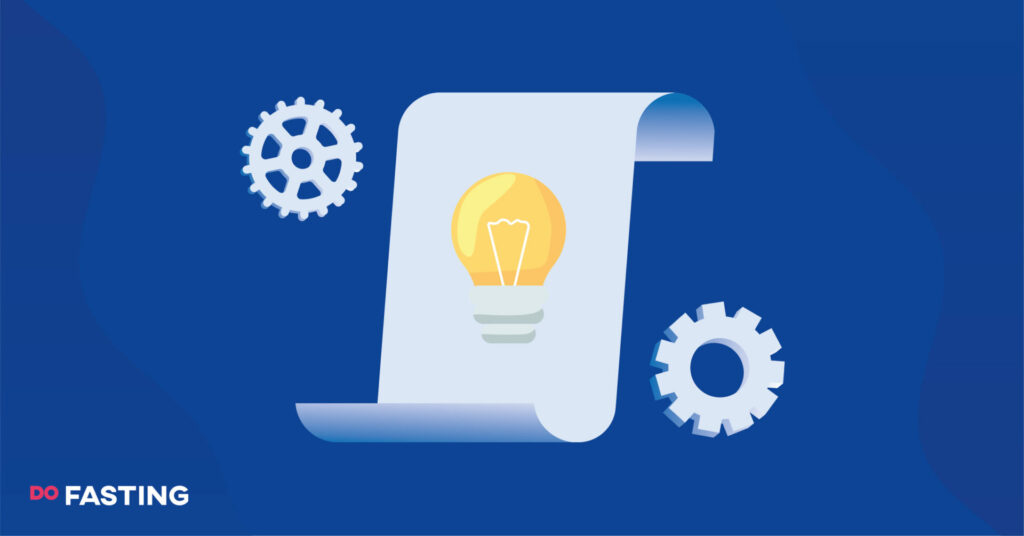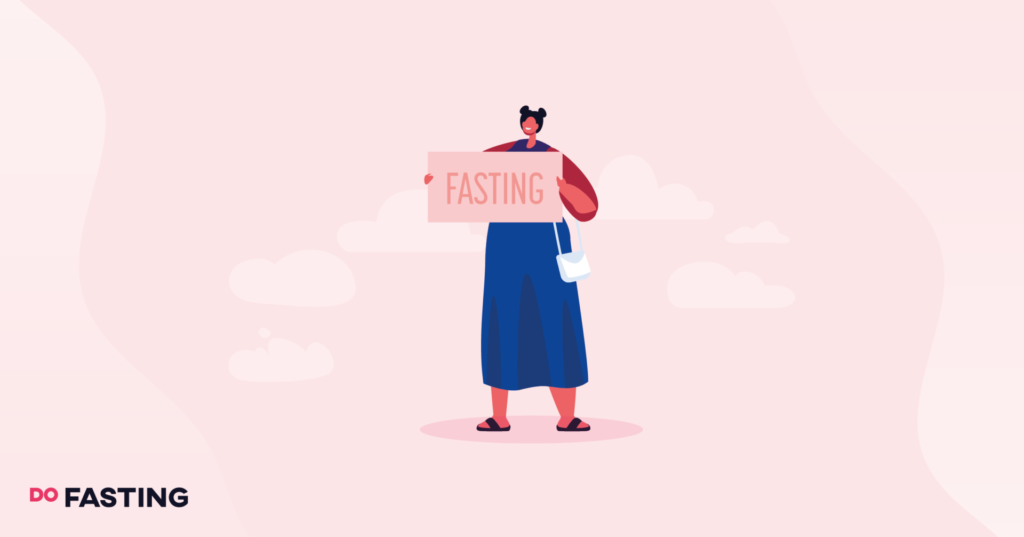Contents
Why Do You Feel Cold During Fasting?
Intermittent fasting makes your body go through many processes and changes. Let’s take a look at what exactly happens that makes you feel cold.
Your body is adjusting to using fat for energy
During intermittent fasting, your body initiates fat burning. Therefore, fat stores are converted into energy. This happens because you’ve been on an empty stomach for a while and there’s no food to take energy from.
This side effect is also an early sign of ketosis, but it doesn’t mean that you’re already in a ketosis state. Therefore, feeling cold along with other symptoms of keto will eventually go away once you actually reach ketosis.
This process also can be referred to as fat adaptation which happens when your body goes on a low-carb diet or an intermittent fasting plan. When you’re fat-adapted, your body will actively burn fat. When this happens depends on your metabolic rate, age, genes, body composition, how active you are, and other factors.
Our bodies contain both brown and white fat. Brown fat generates heat by breaking down glucose and molecules, which helps to regulate body temperature. Extra energy is stored in white fat. Obesity causes an accumulation of white fat. Moreover, intermittent fasting aids in the burning of white fat.
The fat adaptation state lasts as long as you eat your first carb meal. However, more research is needed to know for sure when fat adaptation occurs and how long it lasts.
Take a
1-minute quiz
and discover how much weight you can lose with DoFasting!

Your digestion stops
When you stop eating food, your digestive system also stops. That’s because there’s no need to digest food anymore. Therefore, you’re giving your digestive system a break.
Moreover, your body produces heat by metabolizing food. This is called a thermogenic response. There is no heat created when there is no food to respond to. As a result, you may be feeling chilly.
It takes about 6-8 hours for your meal to pass through your stomach and small intestine. After that, your food still goes through a whole gut transit. However, if you’re fasting, you’re not constantly activating your digestive system by consuming more food, so your gut can rest.
Your blood flow is redirected
Adipose tissue regulates energy supply and demand through hunger and satiety signals. During intermittent fasting, your blood circulation changes direction. Moreover, your blood is moving toward your body’s fat stores. This process is referred to as adipose tissue blood flow.
Feeling cold could indicate that you’re actively burning body fat. Adipose tissue blood flow helps your body use fat as an energy source.
As previously stated, brown fat generates heat and helps with body temperature regulation by breaking down glucose molecules. You can feel cold if the blood flow is redirected away from brown adipose tissue. Nonetheless, your body should adapt and you’ll feel warm again.
Your blood sugar levels drop
Intermittent fasting has an effect on insulin resistance, and therefore, can lower your blood sugar levels. Some studies suggest that intermittent fasting can also improve glucose and lipid metabolism.
When your blood sugar decreases, you may experience some other symptoms such as hunger or dizziness, and feeling cold can be one of them.
Following a meal, your blood sugar levels rise, and insulin is released, which assists in the use of glucose by cells in your body. On the other hand, when you stay on an empty stomach for some time, your blood sugar levels drop.
The state of having low blood sugar can also be referred to mild hypoglycemia.
You may be lacking certain nutrients
Intermittent fasting lowers your calorie intake. You also have a limited amount of time to eat. As a result, getting the necessary vitamins and minerals may be more difficult.
Furthermore, when you fast, you are actively burning fat. There are several fat-soluble vitamins that you may lose along the process.
Certain vitamins and minerals play a role in regulating the heat in your body. Here are some nutrients that you can lose while fasting:
- Magnesium — helps regulate body temperature.
- Selenium — converts T4 enzyme to T3, to maintain normal body temperature.
- Zinc — helps with autonomic thermoregulation.
- Thiamine — can help regulate body temperature.
6 Ways to Keep Warm While Fasting
Keep in mind that while fasting, you might feel cold if your body is new to using fat as an energy source. Here are some tips that will help you stay warm on an empty stomach.
1. Follow the keto diet during your eating window
A ketogenic diet is a low-carbohydrate diet. The main difference from a normal diet is that you consume mostly proteins and fat and avoid practically all carbs such as sugar, pastries, bread, and soda. Therefore, a keto diet allows no more than 20 to 50 grams of carbs per day.
In addition, the dietary macronutrients are split into about 55% to 60% fat, 30% to 35% protein, and 5% to 10% carbs.
The diet makes your body go into ketosis. It’s a metabolic state which allows your body to burn fat as an energy source. Fat adaptation happens when your body adjusts to ketosis completely.
Because the main goal of a keto diet is to reach ketosis, it also speeds up fat adaptation and thus eliminates the cold feeling while fasting.
2. Drink bulletproof coffee
Instead of having a cup of hot black coffee, try out a bulletproof coffee. Bulletproof coffee combines coffee made from high-quality beans, unsalted butter, and MTC oil. The coffee is extra creamy.
1 cup of bulletproof coffee contains 342 calories. Keeping that in mind, you can only consume it on your eating window or it will break your fast.
Caffeine and MCT increase metabolic effects and fat oxidation. There is still limited evidence that shows the benefits of bulletproof coffee. Nonetheless, medium-chain triglycerides (MTC) boost fat-burning and speed up the fat adaptation process.
The faster your body becomes fat adapted, the faster you’ll warm up again.
3. Add healthy fats to your diet
Fat adaptation requires you to add healthy fats to your diet. Fat doesn’t spike insulin levels as much as carbs. Therefore, eating healthy fats helps you avoid storing fat and remain in a fat-burning mode.
Healthy fats can accelerate fat adaption and thus help you get warm.
Additionally, healthy fats nourish your body and promote the efficient functioning of your nerves, brain, hormones, immune system, and metabolism. Examples of healthy and nutritious fats:
Avocados — about 80% fat.
Cheese — is high in vitamin B12, calcium, selenium, and phosphorus.
Fatty fish — rich in omega-3 fatty acids and proteins.
Nuts — high in antioxidants and omega-3 fatty acids.
Extra virgin olive oil — high in oleic acid.
Chia seeds — are high in fat and include alpha-linolenic acid (ALA).
Keep in mind that you can only eat these foods during your eating window as they will break your fast.
4. Exercise – but don’t overdo it
Another way to heat your body is to start sweating. Exercise not only helps with fat burning but will also help relieve the feeling of cold during fasting.
During exercise, your body generates and stores heat, elevating core body temperature by a few degrees. However, don’t overdo it. Doing high-intensity workouts during a fast can make you feel light-headed and nauseous.
Also, burning too many calories can leave you feeling extremely hungry and unable to stick with your fasting routine. Instead of making your body burn, consider doing these exercises:
Walking
Cycling
Hiking
Swimming
Yoga
Pilates
The DoFasting app allows you to practice light-intensity home workouts. It’s a fasting app with everything you need to have the best intermittent fasting experience. A separate fitness section provides a range of simple, beginner-friendly workouts that you may practice at any time.
You should try to be active for at least 30 minutes every day to see results.
Take a
1-minute quiz
and discover how much weight you can lose with DoFasting!

5. Replenish your lost nutrients
In the best-case scenario, your first meal after a fast should have nutrient-rich foods and enough electrolytes. When intermittent fasting, you consume fewer calories and that might also mean that you consume fewer vitamins and minerals.
This is why it is critical to include nutrient-rich foods and electrolytes in your diet. Low iron levels, for example, have an effect on the thyroid, making it less efficient at producing the heat that your body requires.
Low iron levels can also impair circulation and disrupt blood flow, resulting in a loss of warmth. This can also lead to vitamin B12 deficiency that helps generate red blood cells.
Having enough thiamine can also help regulate body temperature. Also, electrolytes play an important role in a lot of functions in your body. To specify, magnesium is an electrolyte that helps regulate body temperature.
Foods to include in your diet to replenish your lost nutrients:
Dark leafy greens
Whole grains
Fish and seafood
Lean meat
Nuts
Dairy
Fruits and vegetables
To make sure that you’re really getting the needed vitamins and minerals, you could also take supplements. Also, it’s important to always stay hydrated.
6. Take a hot bath or shower
If you get cold during fasting, a hot bath or shower is an easy solution. Allowing your limbs to warm up in hot water can help regulate your body temperature altogether.
A hot bath or a shower can activate the body’s thermoregulatory system and even improve your blood pressure.
It doesn’t really matter when you take a bath or a shower. However, if you take one in the evening, it can also improve the quality of your sleep.
Overall, soaking yourself in hot water for a few moments might be the quickest and easiest way to warm up your body, in addition to being an enjoyable relaxing experience.
Signs of Complete Fat Adaptation
Aside from not being cold anymore, you may experience additional symptoms after you have fat adapted.
Decreased cravings and hunger
Ketogenic diets do suppress appetite and can reduce hunger pangs. However, there is limited evidence that fat adaptation leads to decreased hunger and cravings.
According to one study published in 2018, adopting a keto diet leads to lower food cravings, thus fat adaption might let you go without food for a little longer. Nevertheless, further data is needed to be certain that it is the result of total fat adaption.
Increased focus
Ketone bodies are metabolites that are used as the primary source of energy for the brain while intermittent fasting or when glucose is limited. This is also exactly what happens when your body becomes fat adapted.
Moreover, ketone bodies are beneficial for your brain, and therefore, can help increase your focus and mental clarity.
Improved sleep
Even though it might be believed that fat adaptation can improve the quality of your sleep, there are no specific studies to back this claim up.
For example, one study discovered that individuals on a ketogenic diet had no changes in their sleep duration or quality. Other studies found modest benefits for deeper sleep but decreased REM sleep.
As a result, improved sleep isn’t actually an indicator that you’ve fat-adapted.
Take a
1-minute quiz
and discover how much weight you can lose with DoFasting!

Cold While Fasting: Key Takeaways
Feeling cold while fasting is a normal part of fat adaptation. It can also be a result of your digestive system, low blood sugar levels, or a lack of certain nutrients.
In order to mitigate this side effect, you can replenish your lost nutrients, try exercising, drinking bulletproof coffee, or taking a hot bath.
See how DoFasting will improve your life
Find out what works for you with this 60-sec quiz approved by our experts and get your personal revolutionary fasting assistant.
Start the Quiz














